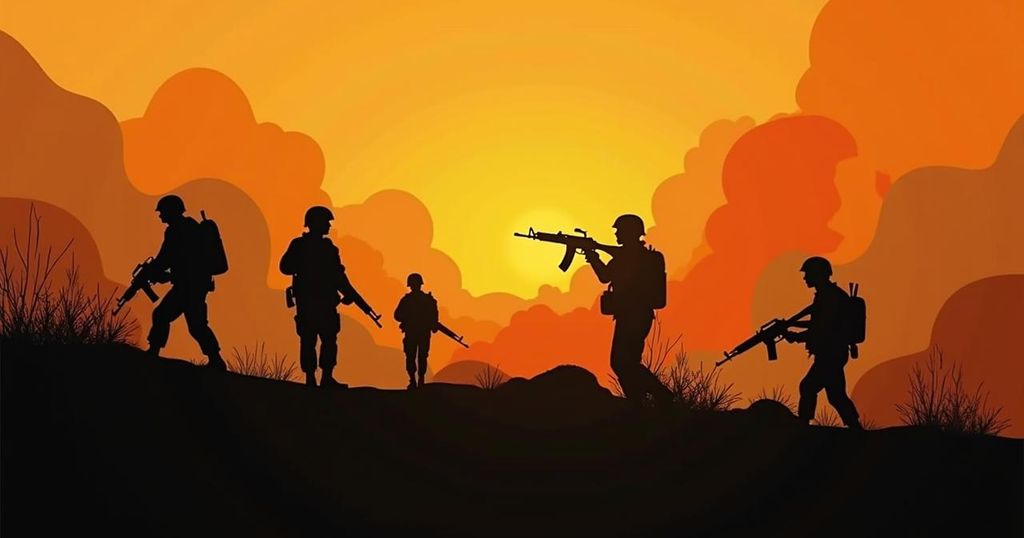Escalating Conflict: Israeli Forces and Hezbollah Clash Amid Iranian Missile Strikes

Recent clashes between Israeli troops and Hezbollah in Lebanon have intensified following Iran’s launch of 180 missiles into Israel, framing a potential escalation toward a broader regional war. Despite ongoing military operations in Gaza and confrontations near the Israeli-Lebanese border, Israel remains firm in its stance against Iranian aggression and support for Hezbollah. Casualties continue to rise amid fears of a protracted conflict that could involve more regional and international players.
Israeli forces engaged in battles with Hezbollah militants in Lebanon following a significant escalation in regional tensions sparked by an Iranian missile barrage targeting Israel. On Tuesday, Iran launched approximately 180 missiles, marking a dramatic increase in hostilities in the ongoing conflict that pits Israel against Iran and its allies, including Hezbollah and Hamas. In response to this unprecedented missile strike, which saw some projectiles intercepted over major cities like Jerusalem, the Israeli military urged citizens to seek shelter. The Iranian assault was celebrated in Tehran, where supporters held demonstrations denouncing Israel and expressing solidarity with Hezbollah. Following Iran’s missile strike, Israeli forces executed retaliatory actions against Hezbollah positions in Lebanon. This ongoing conflict is characterized by devastating airstrikes, particularly in the Gaza Strip, where recent operations have reportedly caused significant civilian casualties. Israeli Prime Minister Benjamin Netanyahu stated that Iran would face consequences for their missile attack, indicating a firmly retaliatory stance. With Hezbollah actively engaging Israeli troops near the border and reports of clashes emerging from Lebanon, the potential for a broader conflict involving regional and international actors has heightened. The situation’s volatility has prompted evacuations in northern Israel as civilians brace for further military action. As the Middle East finds itself at a precarious juncture, where Iranian support for Hezbollah and Hamas manifests in aggressive military operations, the concern for a wider war looms large. The United States has expressed its unwavering support for Israel amidst the escalating conflict, even as humanitarian crises unfold on both sides of the border, particularly in Gaza, where tens of thousands have lost their lives since the onset of hostilities in October 2023. In conclusion, the backdrop of this conflict includes a complex web of historical grievances, political alliances, and military escalations. Both sides appear entrenched in their positions, with no immediate resolution in sight, raising the specter of a protracted regional war that could further exacerbate instability in the Middle East.
The longstanding conflict between Israel and militant groups in the region, particularly Hezbollah and Hamas, has its roots in historical grievances and geopolitical rivalries. Following Hamas’s attack on Israeli territory in October 2023, tensions escalated sharply, culminating in a year-long war that has seen significant casualties on both sides. Iran plays a crucial role in supporting these militant factions, providing military and ideological backing, while Israel seeks to dismantle their capabilities amid regional security threats. The recent missile attacks from Iran represent a major escalation not only in this ongoing conflict but in the potential for a wider war across the Middle East involving multiple national and non-state actors.
The current skirmishes between Israeli troops and Hezbollah, coupled with Iran’s aggressive missile strikes, indicate a severe escalation of hostilities that could lead to a broader regional conflict. Netanyahu’s remarks reflect Israel’s intent to respond firmly against perceived aggression from Iran, while the humanitarian situation in Gaza and Lebanon worsens under continued military actions. The international community, including the United States, is closely monitoring these developments amid fears of a sustained and intensified conflict.
Original Source: apnews.com








